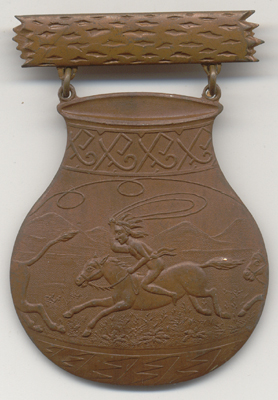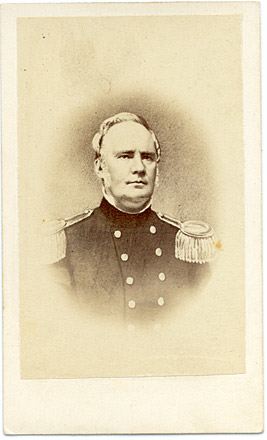Has one small spot on right epaulette, otherwise, CRISP!!
Major general, commanding Missouri State Guard, July 30,
1861.
* * * * * *
Major general, P. A. C. S., March 6, 1862.
Died at St. Louis, Mo., September 29, 1867.
Commands.
Commanding Missouri State Guard, July 30, 1861, to March
16, 1862.
Commanding District of Arkansas, July 24, to September,
1863, and from March 11 to March 16, 1864.
Commanding First Division, Army of the West, March 17,
1862.
Commanding, July 3, 1862, the Army of the West.
July 24 to September 26, 1863, commanding District of
Arkansas.
Commanding, in 1864, division composed of the brigades of
Drayton, Churchill, Tappan and Parsons.
Commanding, in 1864, army corps composed of the divisions
of Fagan, Marmaduke and Shelby.
Commanding Army of Missouri, September 8, 1864.
March 7, 1865, assigned command of Missouri division,
District of Arkansas (Trans-Mississippi Department).
Price, Sterling, born in Virginia, appointed from
Missouri.
Colonel, Second Missouri Infantry, August 12, 1846.
Brigadier general of volunteers, July 26, 1847.
Honorably discharged, November 25, 1848.
Source: General Officers of the Confederate States of America
Major-General Sterling Price, called lovingly by his soldiers
"Old Pap," was born in Prince Edward county, Va., on the 14th
of September, 1809. His early education was acquired in the
schools of his native county, where he was prepared for
Hampden-Sidney college.
After completing the usual course in that institution he
returned to his home and became a deputy in the clerk's office.
At the age of 21 he emigrated to Missouri, when the city of St.
Louis was little more than a depot for the Indian trade, and
when the population of the State was very scattering. He made
his home in Chariton county and soon after received an
appointment as brigadier-general in the State militia.
From his earliest manhood, General Price was a Democrat and in
1836 was elected as such to the general assembly of Missouri.
He was again elected a representative in 1840 and 1842 and at
each session was chosen speaker of the house. In 1844 he was
elected to Congress and served until the opening of the war
with Mexico, when he raised a regiment and had an independent
command in New Mexico and Chihuahua.
He gained victories over greatly superior forces at Cancada,
Lambonda and Taos. In this latter battle with 300 men he
captured 1,500 prisoners. For these services President Polk
appointed him a brigadier general.
Moving next against Chihuahua, at Santa Cruz de Rosales, he
captured the army of General Trias, double his own. This was
really the last battle of the war; for a treaty of peace
between the United States and Mexico had been signed a short
time before.
At the next State election General Price was elected governor
of Missouri by a majority of 15,000 votes. Upon the election
of Abraham Lincoln as president, Missouri called a convention
of which Price was elected president. He was at the time an
ardent Union man, and at the first there was not a secessionist
in that body. But when it was evident that President Lincoln
intended to pursue a coercive policy, the Missouri State Guard
was formed, with Sterling Price as major-general.
General Price still attempted to preserve the peace of
Missouri, but when General Lyon captured Camp Jackson and shed
the blood of the Missourians unnecessarily, as Price and many
other of the best people of the State thought, the Missouri
State Guard and their leader prepared for resistance.
The battle of Elkhorn Tavern or Pea Ridge, in North Arkansas,
was really won by Price and his Missourians, but Van Dorn,
discouraged by the death of McCulloch and McIntosh and the
consequent confusion in the wing commanded by them, and
mistakenly thinking the enemy's force greatly superior to his
own, gave up the victory in his grasp and retreated.
General Van Dorn in his report says: "During the whole of this
engagement I was with the Missourians under Price, and I have
never seen better fighters than these Missouri troops, or more
gallant leaders than Price and his officers. From the first to
the last shot they continually rushed on, and never yielded an
inch they had won; and when at last they received orders to
fall back, they retired steadily and with cheers. General
Price received a severe wound in the action, but would neither
retire from the field nor cease to expose his life to danger."
After the battle of Elkhorn, Price received his commission as
major-general in the Confederate army, dated the day before
that battle. Shortly after the battle of Shiloh, General Price
with his Missourians accompanied Van Dorn to the east of the
Mississippi, and after Bragg had departed for Kentucky they
were left to face greatly superior numbers under Grant and
Rosecrans.
At Iuka and Corinth he and his men fought with great valor.
The year 1863 found Price again in the Trans-Mississippi. But
he was always under the orders of others, some of whom were
inferior to himself in ability.
At Helena, on July 4, 1863, Price's men were the only part of
the army that carried the enemy's works. He co-operated with
Kirby Smith in the campaign against Banks and Steele in 1864.
General Price made his last desperate effort to recover
Missouri in the latter part of 1864.
His campaign was marked by brilliant achievements, but at last,
when within a short distance of Kansas City, he was confronted
by overwhelming numbers of the enemy and forced to retreat.
At the close of the war he was included in Kirby Smith's
surrender, but preferring exile to submission he left the
country and found refuge in Mexico. There he engaged in a
scheme of colonization under the imperial government, but it
proved a very unsatisfactory enterprise.
He returned to the United States and died at St. Louis, Mo, on
the 29th of September, 1867.



